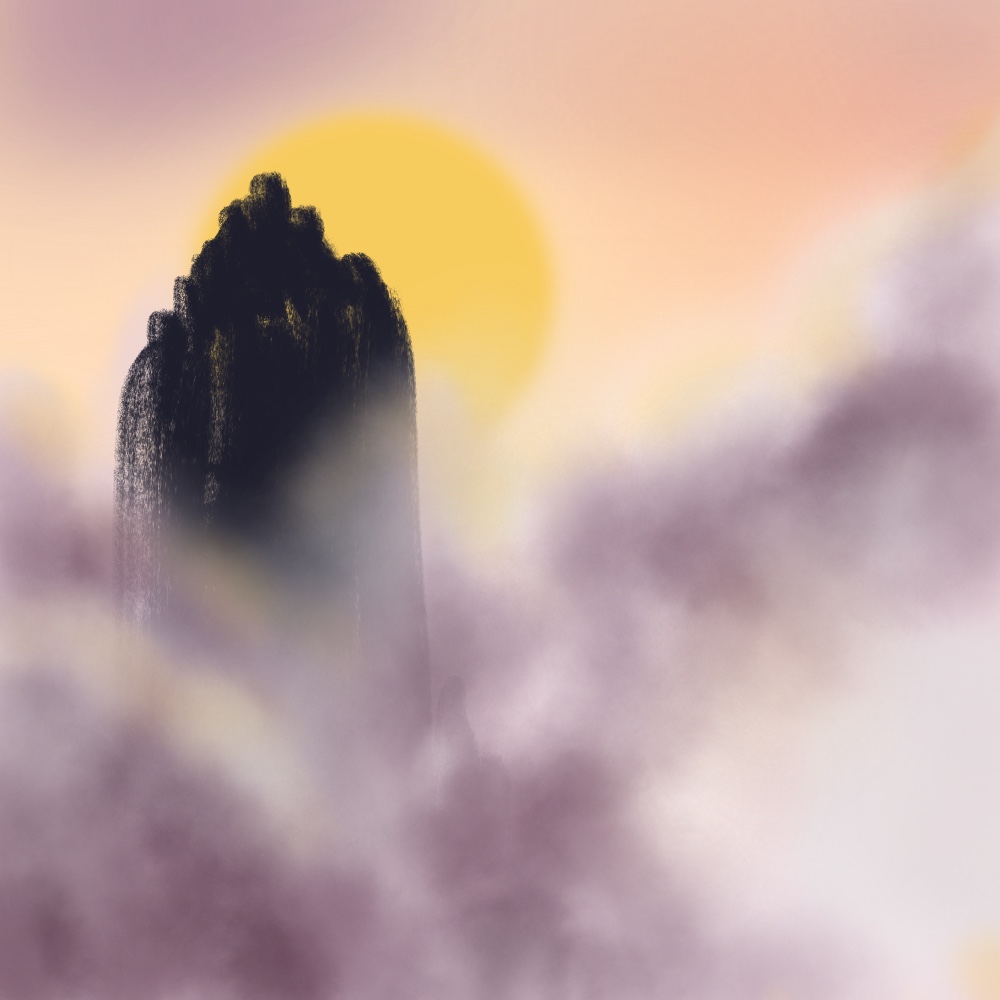Li Bai’s ‘Gazing at a Waterfall on Mount Lu’

April is National Poetry Month, and we’re celebrating with a series of articles that looks at Chinese poetry, both past and present. We begin with a 28-character classic by arguably China’s greatest poet, Li Bai.
(Illustration by Frankie Huang)

Gazing at a Waterfall on Mount Lu
望庐山瀑布 wàng lú shān pù bù
日照香炉生紫烟
rì zhào xiāng lú shēng zĭ yān
遥看瀑布挂前川
yáo kàn pù bù guà qián chuān
飞流直下三千尺
fēi liú zhí xià sān qiān chĭ
疑是银河落九天
yí shì yín hé luò jiŭ tiān
Sunlight illuminates Incense Burner Peak, kindling violet smoke;
from afar, a waterfall hangs before the river.
Water flies straight down three thousand feet—
Has the silver stream of our galaxy plunged from highest heaven?
— Translation by Tiana Wang
Translator’s note: Most translations render 挂 (guà) as “plunge,” but I think part of this poem’s strength is the unexpected use of that character to describe the waterfall. It associates nature with more mundane elements of everyday life (e.g., hanging up clothes) while suggesting deliberate placement. The first character in the final line, 疑 (yí), is particularly tricky. Burton Watson (from whom I’ve borrowed “kindling violet smoke”) translates it as “I think,” but that does not adequately convey the speaker’s skepticism and doubt. I am also reluctant to use “Milky Way” as the direct translation of 银河, because Li Bai would not have had that word in his arsenal in the 8th century. On a more minor point, translating 九天 — jiǔtiān, literally “ninth heaven” — as “highest heaven” conveys the idea that the galaxy fell from a very high plane without resorting to an esoteric term of Chinese cosmology.

In A.D. 756, after a stint at the imperial court, Li Bai 李白, already regarded as one of the Tang Dynasty’s most famous poets, retired to Mount Lu in Jiangxi Province. It was during this time that he wrote two poems describing the incredible beauty of Incense Burner Peak 香炉峰, one of Mount Lu’s four peaks.
The two poems share a name — “Gazing at a Waterfall on Mount Lu” 望庐山瀑布 — but the second, shorter one has entered Chinese poetic canon. In just four seven-character lines, Li Bai captures the awe of the torrents from both afar and up-close, in both a naturalistic and a cosmic sense.
日照香炉生紫烟
遥看瀑布挂前川
飞流直下三千尺
疑是银河落九天
Mount Lu is now a UNESCO World Heritage Site, and if you do an internet search for Lushan Waterfall 庐山瀑布, you can get a glimpse of what inspired Li Bai so long ago. It is, no doubt, majestic. But in this case, we prefer the poet’s words.
Sunlight illuminates Incense Burner Peak, kindling violet smoke;
from afar, a waterfall hangs before the river.
Water flies straight down three thousand feet—
Has the silver stream of our galaxy plunged from highest heaven?
In Chinese poetry, the mark of a good poet is his ability to impart a lifelike quality to objects or phenomena — to give them 活力 (huólì), vitality. In this poem, Li Bai demonstrates his talent in spades. Sunlight strikes the mountain and purple mist rises to envelop the peak. The waterfall “hangs” — 挂 guà — above the river that it flows into.
Who suspended the waterfall, and why? It doesn’t matter. It simply is, like a length of silk cloth reflecting the light in curious ways: Under the sun, shadows and ripples of light play across the textured surface.
While the first two lines construct a panoramic view of the Lushan Waterfall and Incense Burner Peak, the third and fourth lines are from a much closer perspective. The speaker is no longer seeing from a distance the single stream of the waterfall connected to the river. Instead, the speaker is communicating the full force of the current from up close, which he describes as 飞流 (fēi liú) — literally, fly-flow: the water is so powerful, so swift and animated that it is “flying” (飞) straight down great distances from the peak of the mountain, as if it is a river (which “flows,” 流) that has been rotated 90 degrees.
The true beauty of this poem, what makes it really extraordinary, lies in the final line. Here, Li Bai likens the waterfall to the Milky Way — 银河 (yínhé), or “Silver River.” He forces the reader to imagine looking up from the base of the waterfall, the constant battering of water against rock. The waterfall stretches above you, seemingly endless. Underneath, you lose your sense of time. Day and night blur, so that even when the sun is out, the celestial bodies that belong to the night seemingly crash down from the heavens.
Humans have long been fascinated with space — the first telescope appeared in 1608, the first man walked on the moon in 1969, and last week, astronomers unveiled the first-ever picture of a black hole — but way before all that, in 756, Li Bai was peering up and searching for ways to bridge the gap between what exists on earth and all that lies beyond.
We’re celebrating National Poetry Month by looking at Chinese poetry, past and present. Follow our series here.





